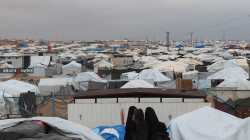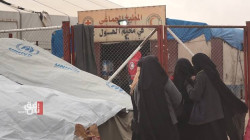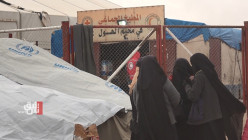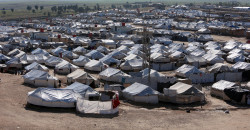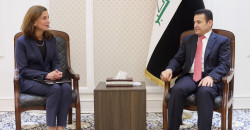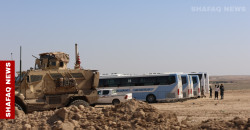Security vs. Humanity: Iraq's struggle with ISIS repatriation
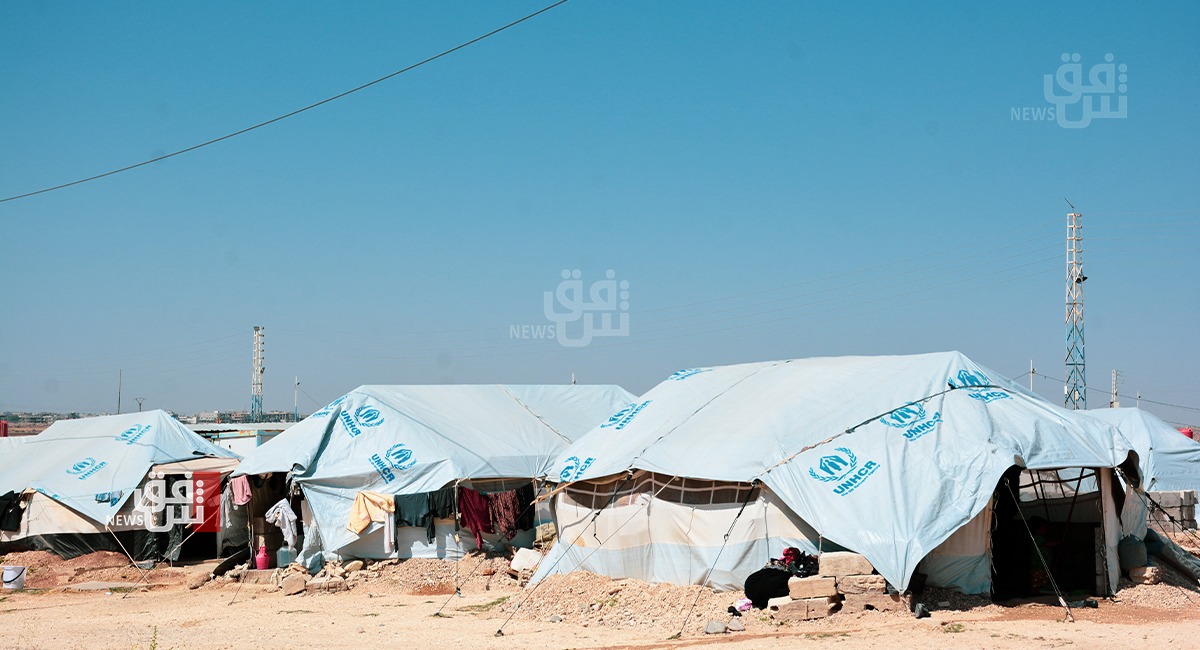
Shafaq News/ Amina (pseudonym), a 36-year-old mother of four, has traveled a long road from despair to hope. After enduring five years in Syria’s al-Hol camp, where conditions were harsh, she and her children were transferred to the al-Jadaa rehabilitation center in Iraq. Reflecting on this experience, Amina says, "I never imagined we would have a second chance. My children now attend school, and I am learning tailoring to support my family."
Amina’s story is one of many, as hundreds of families are now striving for a brighter future, despite their painful pasts.
Al-Hol: A Desperate Humanitarian Situation
Located in Syria’s al-Hasakah province SDF-controlled Al-Hol camp remains one of the most critical security concerns in the region. Initially set up to house individuals displaced by the fight against ISIS, it has evolved into a containment facility for tens of thousands of people linked to the extremist group.
As of early 2025, official estimates indicate that al-Hol holds around 52,000 people, including more than 32,000 Iraqis. Though 21 groups of families have already been transferred to Iraq, approximately 15,000 Iraqis remain in the camp, alongside 11,000 militants.
The Iraqi government views al-Hol as a "ticking time bomb." Former National Security Advisor Qasim al-Araji described it as "one of the most dangerous places in the world, where extremist ideology continues to fester." The camp is plagued by violence, with frequent attacks on security personnel and reports of ISIS loyalists maintaining control through intimidation and threats.
Since 2021, Iraq has been actively repatriating its citizens from Syria's al-Hol camp, with over 11,500 individuals returned to date. In a recent operation on February 9th, 2025, 155 Iraqi families, totaling 569 people, were transferred to Iraq's al-Jadaa camp near Mosul.
Upon arrival at al-Jadaa, returnees undergo security screenings and participate in reintegration programs designed to facilitate their return to their home communities. Despite these efforts, thousands remain in al-Hol, with plans to organize at least two repatriation convoys per month to expedite their return.
The Iraqi government aims to repatriate all its nationals from al-Hol by 2027, acknowledging the complex challenges involved in reintegrating individuals associated with ISIS.
A Path to Reintegration
To address both security concerns and humanitarian needs, Iraq launched the al-Jadaa rehabilitation program. Located south of Mosul in the Nineveh Province, this camp serves as a transitional space where returnees undergo psychological, educational, and vocational training before being reintegrated into society.
According to Karim al-Nouri, Iraq’s Deputy Minister for Migration and Displacement, the al-Amal Community Rehabilitation Center in al-Jadaa "offers structured programs to ensure that returnees, especially children and women, receive the necessary support to rebuild their lives." The program includes:
- Education and Psychological Support: Children participate in structured schooling, sports, and counseling programs designed to help them recover from the psychological impacts of war and extremist indoctrination. Since the program’s launch, more than 5,000 children have benefited from education and psychological care, with specialized trauma counselors working closely with them.
- Vocational Training for Women: Over 1,200 women have completed vocational programs, such as tailoring, handicrafts, and small-scale business training, empowering them to financially support their families. "These women are often the primary caregivers, and empowering them economically is key to long-term stability," explains Hanaa al-Tamimi, a program coordinator at one of the training centers.
-Security Screening and Risk Assessment: Each returnee undergoes a rigorous vetting process before entering the program. Security officials ensure that those with direct ties to terrorist activities are separated from the general population. To date, more than 8,000 individuals have been screened, with hundreds flagged for further investigation.
-Community Reconciliation Programs: Iraq has facilitated over 150 town hall meetings with tribal elders, community leaders, and families of ISIS victims. "Rebuilding trust is the hardest part," says Sheikh Mahmoud al-Jubouri, a tribal leader from Mosul. "Many families still resent those returning, and healing these wounds will take time."
-Relocation Assistance: For individuals who cannot return to their original communities due to security risks or tribal conflicts, the government offers alternative relocation options. To date, at least 700 families have been resettled in new areas with support from humanitarian organizations.
Since 2021, around 2,442 families have completed rehabilitation and successfully returned to their hometowns. However, 2,461 families remain in al-Jadaa, undergoing further evaluation before they can reintegrate.
The length of stay at the camp varies, with some families completing the program in three to six months, while others require more than a year. Although the Iraqi government considers the al-Jadaa program a success, there are still challenges to overcome. "Not every participant is ready to abandon extremist ideology overnight," says Fadel al-Gharawi, head of Iraq’s Strategic Human Rights Centre. "De-radicalization is a complex process that requires sustained investment and effort."
However, despite the broad scope of Iraq's rehabilitation program, it does not extend to all individuals linked to ISIS. Those directly involved in acts of terrorism, especially those responsible for killings or orchestrating attacks, are excluded from the program.
Legal expert Mohammed Jumaa explained, "Under Iraq’s new Amnesty Law, terrorism-related offenses that did not result in death or injury may be eligible for pardon, but known ISIS fighters and commanders are subject to prosecution." This exclusion underscores the complexity of Iraq’s strategy. Iraq’s judiciary has classified many former ISIS members as high-risk individuals, and its counterterrorism laws allow for the indefinite detention of individuals deemed a threat to national security.
Welcoming Back ISIS: The Repatriation Dilemma
The rehabilitation initiative in Iraq has sparked significant opposition from political and security figures, raising concerns about its long-term effectiveness. Sherwan al-Dobardani, a lawmaker from Nineveh, expressed his skepticism, questioning whether these programs could truly undo years of radicalization.
"Many of these returnees were raised in an environment where ISIS ideology was the norm," he said, highlighting the ongoing risk of sleeper cells reactivating. Al-Dobardani also pointed out that many returnees have shown no remorse for their involvement with ISIS, with some even actively resisting attempts at rehabilitation. He added, "We’re not just bringing back innocent families; we may be welcoming future terrorists into our midst."
MP Sherif Suleiman has called for an immediate halt to the repatriation process, arguing that "allowing the return of these families undermines social stability and raises security risks. If this decision were purely Iraqi, we would not be accepting them back."
Suleiman further stressed that many of the returnees are from communities that have suffered deeply at the hands of ISIS. He noted that returning these individuals could exacerbate sectarian tensions and tribal conflicts, especially in areas like Mosul and Al-Anbar, which were heavily impacted by the group's brutality.
On the other hand, Iraq’s rehabilitation efforts represent a step in addressing the legacy of ISIS, though the country faces persistent challenges. Security expert Fadel al-Gharawi emphasizes the urgency of the situation, urging Iraq to act quickly: "Iraq must repatriate and rehabilitate all remaining Iraqis in al-Hol. The camp is a breeding ground for future extremism, and leaving thousands of radicalized individuals in limbo is not a viable solution."
Al-Gharawi notes that as of February 2025, roughly 15,000 Iraqis remain in al-Hol, some of whom were directly involved in ISIS's activities. "If we don’t act now, we risk allowing this ideology to spread even further," he warns.
Iraq’s efforts to tackle the al-Hol crisis come at a time of rising geopolitical uncertainty. Recent reports suggest that the US is preparing to withdraw its remaining forces from Syria, a move that could destabilize the region further.
In early February 2025, Pentagon officials confirmed plans for a US military pull-out, warning that "an American withdrawal could lead to an ISIS resurgence, particularly in detention centers and camps where thousands of extremists are held." Experts fear that without American oversight, the camps could become breeding grounds for radicalization, and the loss of US support could leave the region vulnerable to a resurgence of extremist activity.
In addition, the withdrawal of US forces raises the possibility of a large-scale escape of detainees, many of whom are key members of ISIS. According to a report by the Syrian Democratic Forces (SDF), at least 2,000 ISIS fighters remain detained in north-eastern Syria, with their fates uncertain in the wake of the American withdrawal. "The US military presence in Syria has been a stabilizing force," said an SDF spokesperson, "and without it, the entire region could see a dangerous rise in ISIS activity."
At the same time, international human rights organizations are advocating for a more compassionate approach. "While security concerns are valid, the humanitarian aspect cannot be ignored," said Faisal al-Jabari, a spokesperson for Human Rights Watch in Baghdad. "These people were victims of ISIS as well, and many have been forced into this ideology. Rehabilitation and reintegration programs are the only way forward." Al-Jabari’s comments align with the position of many international organizations that urge Iraq to continue its repatriation efforts, arguing that neglecting to rehabilitate returnees could create an even larger security problem in the future.
